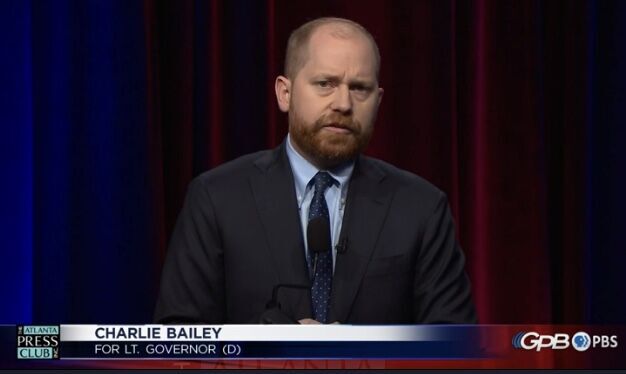Bailey attends lieutenant governor debate solo ahead of June 21 runoff election
Published 12:00 pm Thursday, June 9, 2022

- Democrat candidate for lieutenant governor Charlie Bailey said his runoff opponent Kwanza Hall is unfit for the role due to his absence from a debate.
ATLANTA — Democrat candidate for lieutenant governor Charlie Bailey said his runoff opponent Kwanza Hall is unfit for the role due to his absence from a debate.
During the solo debate, Bailey also referred to a mysterious incident where Hall obtained a position of senior adviser to Atlanta Mayor Keisha Lance Bottoms in violation of the city charter. The charter prohibits elected officials from working for the city until one year after the term ends.
An outside firm sanctioned by Lance Bottoms to investigate Hall’s hiring could not determine who hired Hall and he denied knowing that he was even in the position or that he was being paid for the position.
According to the investigation, Hall received two payments totaling $10,300 in early 2018. He repaid those payments in September 2018.
Bailey questioned the arrangement during his solo appearance at the debate, adding “it’s a pattern of a lack of respect for voters. It’s a pattern of an unserious person. If you cannot stand up with voters, tell them what you believe, listen to the questions of a free press, you’re not prepared to be a lieutenant governor.”
As the second highest elected official in the state and the president of the Senate, the lieutenant governor presides over debate in the Senate chamber and works with advocates to introduce legislation. In the event the governor is incapacitated, the lieutenant governor assumes the powers of governor.
Current Lt. Gov. Geoff Duncan is not seeking reelection.
Hall and Bailey received the highest amount of votes in the nine-person Democrat primary race for lieutenant governor May 24. Hall received 30% and Bailey received just under 18%
Hall had been elected in a 2020 special election to fill the remaining term of the late-Congressman John Lewis. Hall served on the Atlanta City Council before running unsuccessfully for mayor in 2017.
Bailey nearly won the his 2018 race for attorney general, receiving 49% of the vote. He said instead of running again for attorney general, he shifted to the lieutenant governor race after being prodded by Democrat party leaders.
Bailey, a private attorney, said he’s the only candidate who can bring justice to Georgia residents.
“The idea that when wrong has happened, sometimes the only person that can make it right is a lawyer or a prosecutor when it reaches that point,” Bailey said. “We need someone who cares about justice and has a career getting justice for people in the office of lieutenant governor, someone that knows how to use the law, to protect people and to get them justice.”
The Georgia legislature is currently controlled by Republicans but Bailey said he would use the powerful lieutenant governor position, if elected, to push his priorities, which he says aligns with those of Democrat gubernatorial candidate Stacey Abrams.
The winner in the June 21 runoff will face Republican nominee Burt Jones in the November General Election. Early voting for the runoff starts June 13.
Jones is the only Trump-endorsed candidate to succeed at the state-level races in the May primaries. He clenched just enough votes (just over 50%) to avoid a Republican runoff for lieutenant governor in the four-person race.
“We’re going to show a contrast in my ideas, which is for expanding Medicaid, making technical college tuition free again in the state of Georgia,” Bailey said. “… Actually not giving teachers just a bonus, but a real raise. I think we ought to be paying our teachers $70,000 (to) $90,000 a year. And I think those values are the values of the people of Georgia, and the values of Burt Jones and Donald Trump and authoritarianism and extremism are not the value of Georgians.”
Bailey said he supports gun restrictions. He reflected on his time as an organized crime prosecutor in Fulton County, recalling a drive-by shooting where a 9mm gun with 50-round drums was used.
“That that kind of firepower, and I would include in that these machine guns, these are assault weapons that were built for the military,” he said. “The 1994 (federal) assault weapons ban worked and we need to go back to that. We need to have a policy around guns (that) respects life and human beings, not inanimate objects.”




